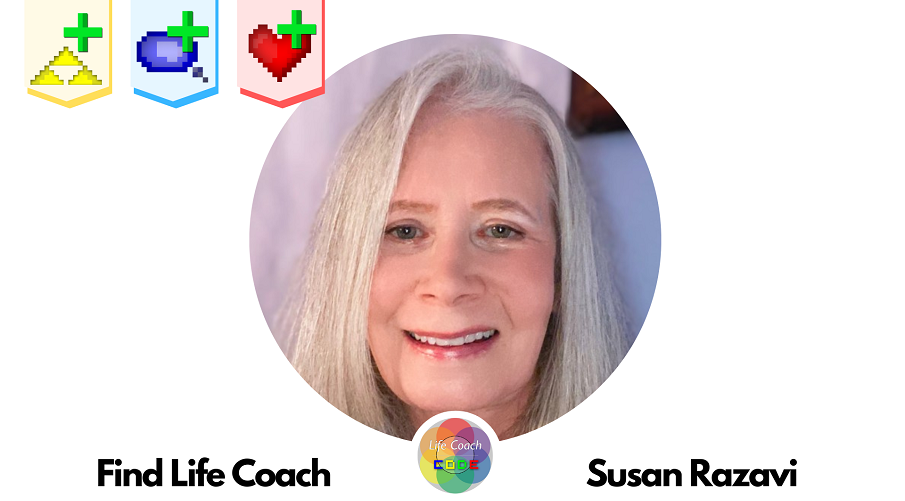Susan Razavi is one of the coaches that we found this month and we did a little interview with her. She impressed us with her dedication and achievement.
She described her evolution from a traditional approach to an integrative one, incorporating Eastern and Western mindfulness, yoga, and stress management. Her own personal transformation, overcoming ego driven self identification, has significantly shaped her coaching style. What makes her approach unique is the integration of hypnotherapy with mindfulness practices.
She specializes in helping clients navigate life transitions, particularly the open minded Gen Z, who value the mind body spirit connection. Clients working with her report feeling reassured, emotionally stable, and making tangible progress in their lives.
She stands out for her responsiveness and additional resources, including various therapeutic modalities such as cognitive behavioral therapy, dialectical behavioral therapy, motivational therapy, holistic and integrative therapy, hypnotherapy, and Vedic counseling. Overall, her coaching offers a holistic and adaptable approach that fosters individual growth and transformation. Here is what she said.
Meet Life Coach Susan Razavi:

Name: Susan Razavi, LCSWR
Pillar: The Spirit, The Mind, The Heart
Who is this coach for: Anyone, especially open minded Gen Z individuals, who want reassurance, emotional support, and a helping hand on their way of making progress to reach their goals.
How they can help: By using various tools and techniques like Cognitive Behavioral Therapy, dialectical behavioral therapy, hypnotherapy and vedic counseling, just to name a few.
First of all, how are you and your family doing after these Pandemic times?
Fine.
How did the coronavirus pandemic affect your clients? Did it affect you at all?
I think many of my clients suffered a great deal, and there was a lot of cognitive dissonance.
Many of my clients are also still dealing with the repercussions of the coronavirus pandemic.
Many people did not know how to remain emotionally stable and needed support to help them get through that difficult time.
I did feel overwhelmed and looking back on it.
I probably would have not taken on so many clients.
What are the biggest lessons that you learned in this pandemic?
Integrity, non violence, truthfulness, non possessiveness.
I would say that those principles taught me that I should always try to be as compassionate and empathetic as possible while being a professional.
The Origin:
Tell us about you, your career, how you started with your coaching career?
About 20 years when I started private practice, I included more of an integrative approach.
I became educated about eastern practices, as well as western mindfulness, yoga, managing stress, building life skills.
What was your biggest obstacle that you had to overcome in your life that made you who you are today?
I wouldn’t say that there was a big obstacle other than my own ego.
I used to misidentify myself as being who others perceived and taught me to be.
I saw that I was identifying myself with people, places, and things that were impermanent.
I was able to build my awareness and gradually change my identity and how I projected myself.
It was a long process for me, and I understand that usually it is a long process for most people to transform their lives.
I have found, however, that that change can happen more rapidly with the use of hypnotherapy.
The Coaching Style:
How do you innovate with coaching your clients?
I find that many of my clients are going through transitions, and they feel stuck.
For example, GenZ is more open minded and able to see the value of a mindbody spirit connection in transitioning into mature adulthood.
What’s unique about your coaching approach?
I combine hypnotherapy with eastern and western mindfulness.
I can approach somebody in hypnotherapy in different ways.
What benefits do your clients get after working with you?
My clients told me that they feel reassured, more emotionally stable, and making progress in their lives.
Other than that, I can’t make generalities because each person is uniquely individual.
Do you use any specific tools to be efficient with your clients?
Besides being empathetic and compassionate, I try to respond as soon as possible to texts, messages, emails, and phone calls.
I also provide additional resources and referrals.
My modalities include cognitive behavioral therapy, dialectical behavioral therapy, motivational therapy, supportive therapy, holistic, integrative therapy, hypnotherapy and vedic counseling.
The Impact:
If you had a super megaphone that, when you speak into, the whole world will hear your message, what would you say?
That those who think they know don’t, and those who think they don’t know, do.
What is the greatest lesson you have learned in your life?
I have learned to trust in myself.
Your final thoughts?
Therapy and life coaching are very effective ways of improving quality of life for yourself, for your family, and for people you come in contact with.
Where Can You Find Susan Razavi?
If you liked this interview and you would love to find reassurance, emotional support and make progress in your life, go to https://susanrazavitherapist.com/ and see how Susan can help you do that.
If you want to learn more about her coaching, follow her Instagram or Facebook.
If you want to connect more personally with her, you can do that through LinkedIn or by sending her a message on her Email susanjrazavi@gmail.com. It was an honor having this interview with her.
